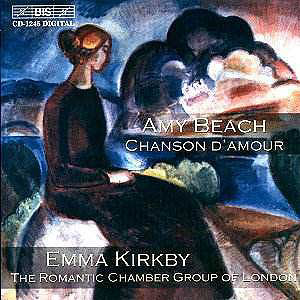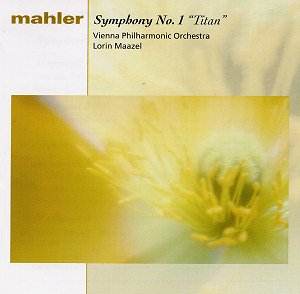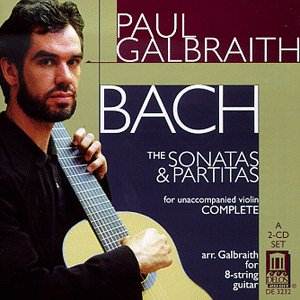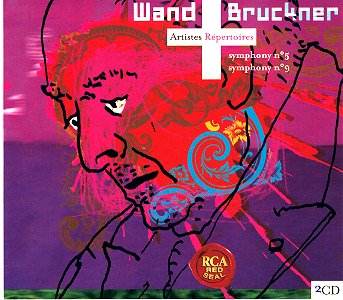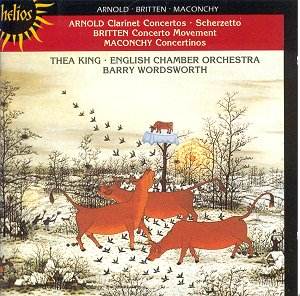 Composer: Malcolm Arnold, Benjamin Britten, Elisabeth Maconchy
Composer: Malcolm Arnold, Benjamin Britten, Elisabeth Maconchy
Works: Arnold – Two Clarinet Concertos, Scherzetto; Britten – Concerto Movement; Maconchy – Two Concertinos
Performers: Thea King (clarinet), English Chamber Orchestra, conducted by Barry Wordsworth
Recording: 1992
Label: Hyperion CDH55060
Duration: 64.35
Date Reviewed: November 2001
In the realm of 20th-century British music, the works of Malcolm Arnold, Benjamin Britten, and Elisabeth Maconchy stand as a testament to the rich tapestry of styles and influences that shaped the musical landscape of the time. This Hyperion recording, featuring Thea King and the English Chamber Orchestra under the baton of Barry Wordsworth, brings together a selection that not only showcases the clarinet’s versatility but also illuminates the evolution of British composition across three pivotal decades.
Malcolm Arnold’s two clarinet concertos, composed in 1948 and 1974, respectively, reveal a stark contrast in both style and emotional breadth. The first concerto, steeped in the post-war milieu of austerity, resonates with rhythmic vitality—its syncopations echoing Bartók’s influence, while Arnold’s characteristic mood-swings impart both buoyancy and melancholy. King’s interpretation here is both incisive and lyrical, balancing the rapid-fire passages with a lighter touch in the more introspective moments. Her ability to navigate the intricate interplay between the soloist and orchestra is particularly commendable, as she maintains clarity even in the most densely woven sections.
By contrast, the Second Clarinet Concerto ventures into a more expansive emotional territory. The divine slow movement emerges with a poignancy that is beautifully articulated by King. The orchestration, featuring a jazzy finale punctuated by exuberant horn calls, highlights Arnold’s playful side, a quality that King captures with a spirited abandon reminiscent of the American jazz influences that permeated British music in the 1970s. The brief Scherzetto from the film You Know What Sailors Are (1953) offers a delightful interlude, showcasing Arnold’s deftness in the film music genre—a testament to his versatility as a composer.
In juxtaposition, Elisabeth Maconchy’s two concertinos, composed in 1945 and 1984, reveal her own evolution as a composer. The earlier work, marked by Bartókian influence and textural clarity, is supported solely by strings, allowing for a purity of sound that complements the clarinet’s lyrical lines. The later concertino adopts a more orchestral palette, reflecting the advancements in her compositional style and the broader musical developments of the intervening years. Here, King’s phrasing is particularly noteworthy; she navigates the dynamic contrasts with both finesse and authority, ensuring that the clarinet’s voice remains distinct against the ensemble’s backdrop.
Britten’s Concerto Movement, orchestrated by Colin Matthews in 1989, adds a fascinating dimension to this collection. The movement’s fragmentary nature—born from Britten’s interrupted concerto project for Benny Goodman—offers insight into the composer’s early stylistic language. King’s interpretation is both sensitive and vibrant, capturing the elusive essence of the work’s thematic material with a lightness that belies its historical weight.
The recording quality is exemplary, with a clarity that allows the listener to appreciate the nuanced interplay between King and the orchestra. Wordsworth’s direction is characterized by a keen sense of balance; the English Chamber Orchestra provides a robust yet transparent accompaniment that allows the soloist’s voice to shine without overshadowing the ensemble’s collective timbre.
In conclusion, this recording not only serves as an homage to the distinctive voice of British music in the 20th century but also highlights Thea King’s remarkable artistry. Her interpretations breathe life into these works, each infused with her deep connection to the clarinet repertoire, shaped in part by her late husband, Frederick Thurston. The interplay of historical context, stylistic evolution, and interpretive depth makes this disc not only a compelling listen but an essential addition to the canon of British clarinet music. Whether for the seasoned aficionado or the curious newcomer, this collection offers a rich and rewarding experience that resonates long after the final notes have faded.
